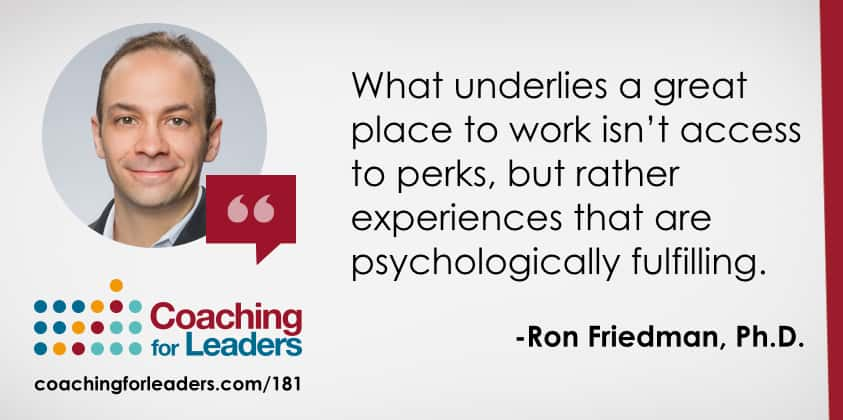culture-branding
Employee engagement pays


Pamela Weaver
HireHive

Pamela Weaver
HireHive


Pamela Weaver
HireHive

Pamela Weaver
HireHive
Less than a third of Americans were engaged in their jobs last year.* Almost one-in-five were ‘actively disengaged’. Add it up and there's a lot of people bored, distracted and fed up employees. According to Gallup, employee engagement is a $550bn problem in the U.S. alone.
On a recent 'How do we Fix It?' podcast, psychologist Ron Friedman said that it’s easy to blame employees for being lazy, but most companies are missing a trick or three in driving workplace engagement. And increasing employee engagement is easier than you think.
Friedman, author of 'The Best Place to Work: The Art and Science of Creating an Extraordinary Workplace', has conducted years of research into areas such as why successful companies reward failure, what casinos can teach us about building a happy workplace and what truly motivates people. More to the point, he has dedicated years to figuring out how to keep people motivated.
According to Friedman, employee engagement isn’t about huge salaries or off-the-wall perks; it’s really about fulfilling basic psychological needs on a daily basis. Of these psychological needs, Friedman pinpoints three key ones – and suggests how employers can meet them.

Competence
People need to feel not only competent at their job, but that they can grow that competence on a day-to-day basis. According to Friedman, when employees view their organisation as a vehicle for their own professional growth, they develop a greater sense of attachment and engagement. Beyond the basic productivity improvements that follow, this can lead to more innovative ideas or process improvements.
Try allocating a reading budget – a monthly or quarterly allowance to buy a book relevant to their role. Or establish an office library. Encourage them to take time out during the day to read industry blogs. By helping employees to explore new ideas within their industry, you’re encouraging them to re-create their own job every day, looking for new ways of doing things or presenting new ideas. “When people feel good at their job, when they feel like they’re growing, they’re going to do better work for you regardless of the size of your business or the industry you operate in,” says Friedman.
Engagement and connection with other colleagues is vital. Friedman says this is an easy win for employers. For example, instead of presenting new hires to the organisation in terms of their CV, share a little information about their interests outside of work – it helps create common ground. “Research shows that the people who get along best at work are the ones who spend time talking about non-work matters…That might sound like gossip to a lot of people but the reality is that the better connected people are, the more productive and engaged they are…Any time you have a ‘them’ in an organisation, it’s a sign of dysfunction.”
This is less about insisting that everyone do things your way than it is about giving people their own choices. For managers, this can be as simple as letting employees into your thinking processes and inviting their ideas rather than standing over them and just saying ‘This project is critical. I need xyz by Monday so just do it.' According to Friedman, you’ll get better quality work by explaining why it's critical, introducing your ideas for what would work and soliciting their input for what could work. Even if you don’t run with their ideas, people appreciate being asked and valued.
As Friedman told 'How Do we Fix It?', there’s a big difference between engaged employees and happy employees. The smart companies are the ones that dedicate time to working out the ideal mental state and environment for specific roles. These companies will go out of their way to encourage and facilitate this ideal environment.
And you thought it was all because you couldn’t get budget for a staff sushi bar.
Sign up for our monthly newsletter to receive the latest news, insights, and exclusive resources.

“HireHive makes the team a lot more productive. We’d be lost without it. Team Leaders can do it all themselves if needed or jump in at the right time and know exactly where everything is and what’s happening.”

Hilary Dempsey Head of HR at Life Credit union